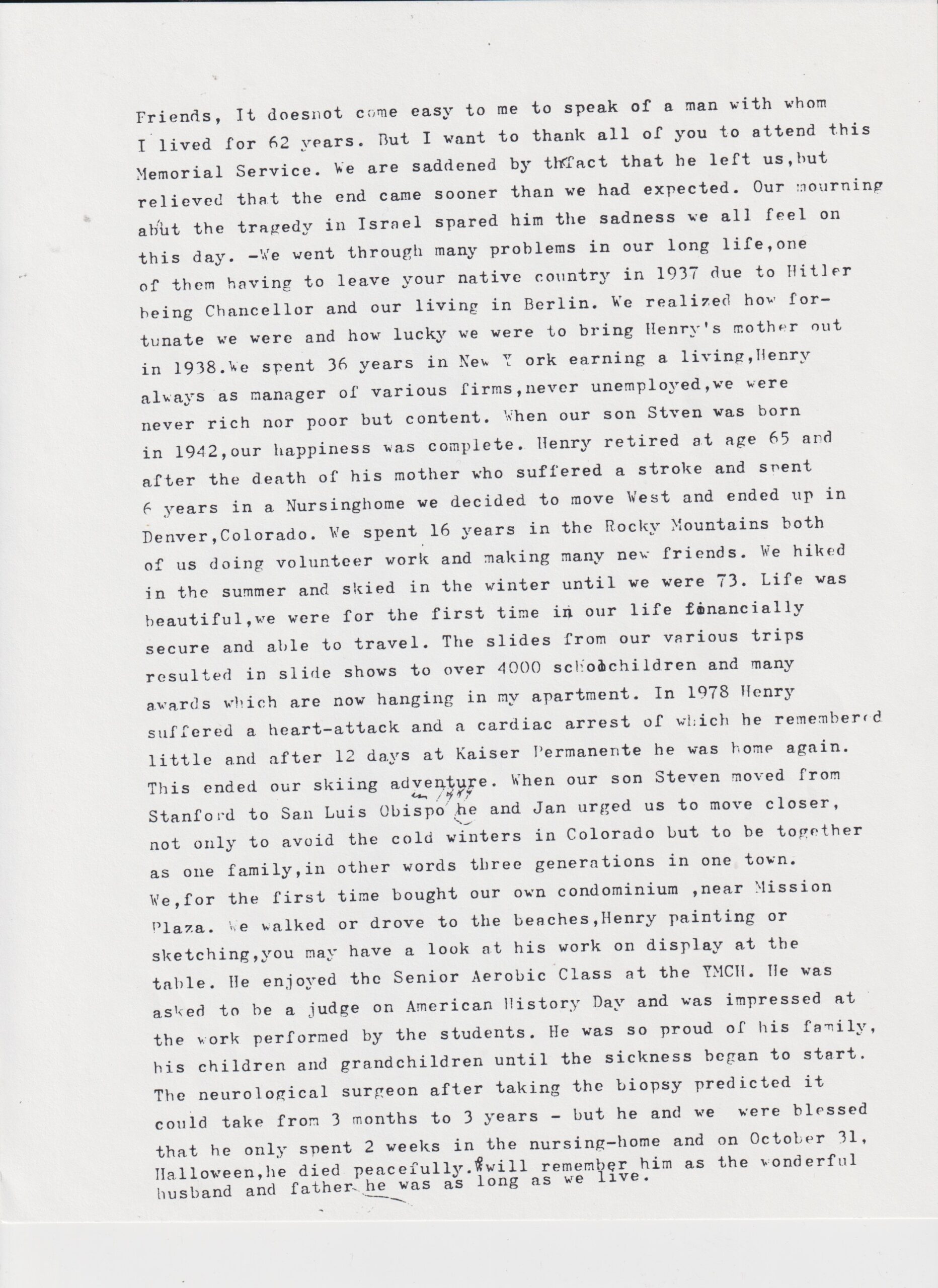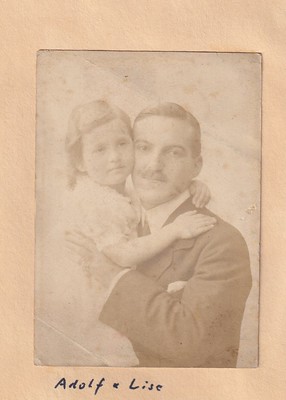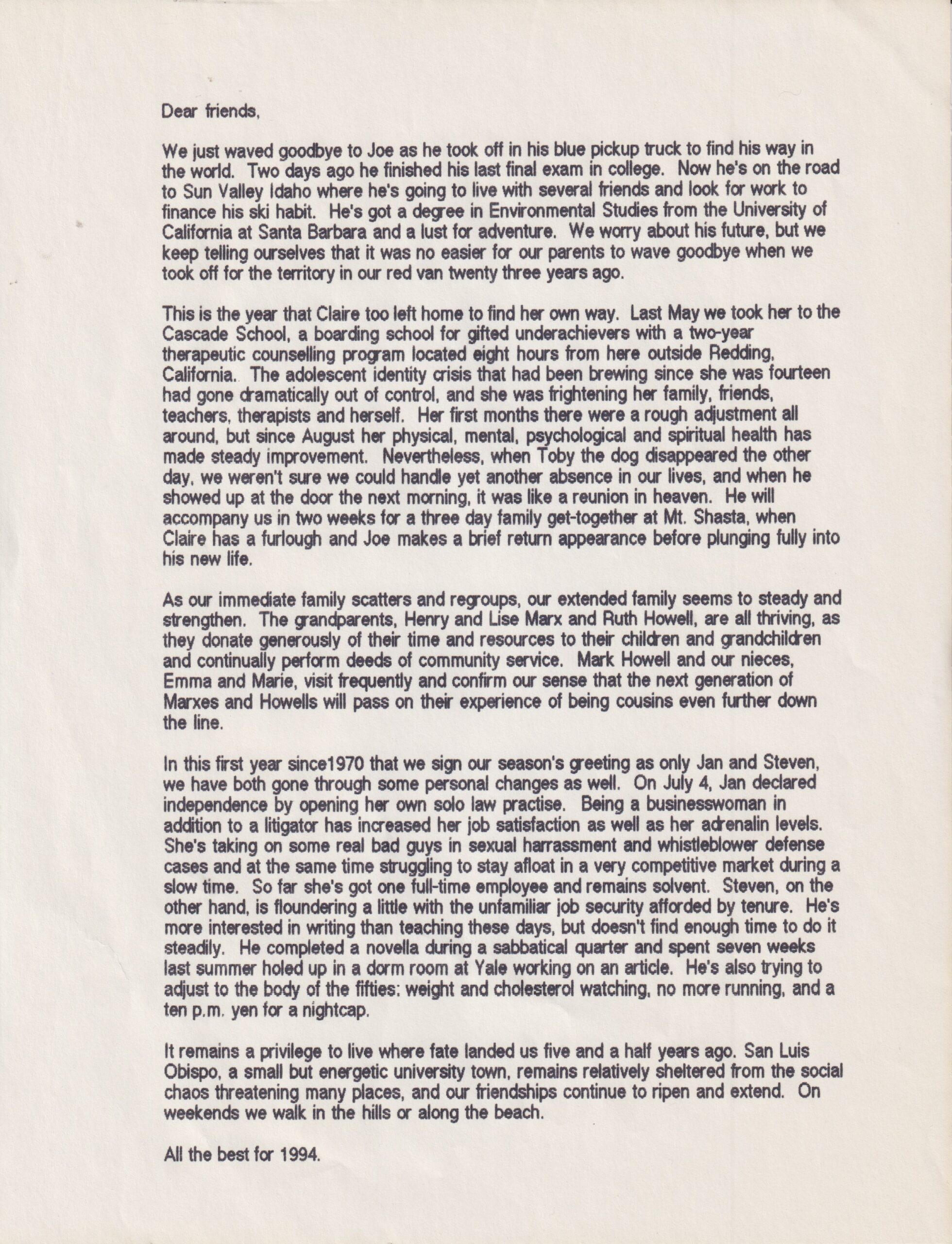Family
Louise Marx: Eulogy for Henry Marx
Saturday, November 11th, 1995
Memorial for Henry Marx November 11 1995
Saturday, November 11th, 1995Eulogy for Henry Marx
Saturday, November 11th, 1995Welcome and thanks for coming today, on behalf of Lise, Henry’s wife, Jan his daughter in law, Joe and Claire, his grandchildren. I’m Steven, his son.
We’ve been amazed by the magnitude of the public tribute to him and the outpouring of sympathy and appreciation–from Denver, where he lived for fifteen years before moving to San Luis Obispo, from New York, from all around the world.
He was a little guy with a large presence; Paula Huston said to me the other day that he’ll be missed by the whole county. Another colleague, Barbara Hallman came up to me yesterday to express condolence with tears in her eyes. I asked her how she knew him. “His letters to the paper, I’ll miss them,” she said.
Grief makes you want to retreat and hide to nurse your wound. Its hard to share with so many people in so public a way.The good and pure memories we want to hoard, the jealous and critical feelings we want to hide, and the stupefying mystery of death itself we want to deny.
But Jan and Lise and I nevertheless decided on the day he died to hold this gathering. For the immediate family, it’s a way to distribute the pain, it’s asking for your comfort, it’s an antidote for our tendency to withdraw into isolation
For all of us, its a chance to make up for some of the loss we feel to our community by pooling our regard for Henry and building a lasting monument to him in our memories.
The reason we’re in the Y today is not only because of the graciousness of the managment and the fact that it has a large room and lots of parking space. Henry used to say that going to senior aerobics at the Y twice a week was his religion. He was only half joking.
Since his adolescent involvement with the German youth movement, he believed in worshipping the temple of the body. Fitness was his credo. He treasured his health, and he saw that maintaining it was his own business. Working out here made him feel good and counteracted his tendencies toward depression about current events. The idea of senior aerobics fit his attitude toward old age and the approach of death in general–affirming what you still have, rather than regretting what you’ve lost.
The first tolling of his bell occurred here. Heading home for lunch after his workout on May fifth, he drove out of the parking lot, down Southwood, Laurel Lane and Orcut to the intersection and then made a left turn instead of a right on Broad street. An hour later, the Park Rangers found him disoriented, spinning his wheels near the ocean in the Nipomo dunes.
After they brought him home, he had a series of seizures, but with medication and a couple of weeks rest, he was recovered enough to be back in this room on a regular schedule, and in July, he insisted that I join him one day to exercize and to meet his friends.
I came back here with Henry in mid October. Two weeks after being diagnosed with terminal brain cancer, he was staying in the Cabrillo nursing home, a block away, on Augusta Street. It was a warm afternoon and I took him out in a wheelchair to the nearest place one could appreciate the air and see some green. It was the park right outside. We sat together in the shade of the Eucalyptus trees and talked about native and imported plant species, about medicare, about the privilege of living in this town. It was our last sustained conversation, the last time he was out of bed.
I felt blessed to be able to take many farewells from my father during his monthlong departure from this world. One of the most memorable occurred when he talked about his grandparents, and how their presence was so strong with him during those last days. Then he cried bitterly and said he didnt want to die. Without thinking, I replied that he would remain, just as his grandparents existed in him at that very moment. He nodded and pulled me to him. With all of us here now I say, goodbye Henry, and I say you are still here in the memories and the legacy of the good you leave behind.
Obituary for Henry Marx April 19 1906-October 31 1995
Sunday, November 5th, 1995Henry Marx, 88, of San Luis Obispo, died Tuesday October 31 at a San Luis Obispo Care Center. A memorial gathering will be held at the YMCA Fitness Facility, 1020 Southwood Drive, San Luis Obispo, at 3:00 P.M. Saturday November 11.
Mr. Marx was born in Strassburg Germany, April 19, 1907. He was an enthusiastic participant in the Kameraden, a youth organization dedicated to the appreciation of nature and the arts, to ethical idealism, and to humanitarian service. He married Lise, his wife for 63 years, in Stuttgart Germany in 1932. In 1937, to flee Nazi persecution, they emigrated to New York City, where he worked in business until retirement at age 65. He and Lise then moved to Denver Colorado, where they enjoyed skiing and hiking. In 1989 they settled in San Luis Obispo to reside near the family of their only child.
Mr. Marx was a committed community volunteer throughout his life. In New York he was active in the Democratic party, neighborhood synagogue and Sane Nuclear Policy organizations. In Denver he served as president of the Jewish Community Center, as an officer in the Retired Senior Volunteer Program, and as a tireless visitor to elementary schools, where he presented slide shows about places around the world he had visited. His efforts were recognized with a Senior of the Year award, a Community Volunteer award, and an Americans by Choice award.
In San Luis Obispo, Mr. Marx continued his volunteer work into his late eighties. He gave talks and slide shows in high schools, junior highs and at Cal Poly in order to pass on his experiences as a witness to the Nazi Holocaust as a reminder and a warning to the younger generation. He was a Hadassah associate and a docent at the Arts Center. Mr. Marx’s hobbies also produced contributions of energy to community organizations. He was a member of the YMCA Senior Aerobics Club and the Art Center’s Thursday Painters Group.
Mr. Marx is survived by his wife, Lise, his son, Steven, and daughter-in-law, Jan Howell Marx, and his grandchildren, Joe Montgomery Marx and Claire-Elise Grace Marx.
Day of the Dead–October 31 1995
Tuesday, October 31st, 1995At age 88, my father Henry was in good health and spirits, except for an episode of disorientation and seizure in early May. He participated in aerobics at the Y twice a week, was active in community organizations, went sketching regularly with the Thursday painters, and took hikes with me.
At the end of September, he started losing his memory and balance. Without the consent of his primary care physician, he consulted a neurologist, who ordered tests which showed terminal brain cancer. In the hospital for a biopsy, he fell and broke his pelvis after untying his restraints and getting up to pee at night. This injury left him unable to walk or to urinate. In the transitional care center he lost control over his emotions and would often break into tears. Troubled by persecution fantasies and hallucinations, he repeatedly thanked and apologized to those who were looking after him. “This is not me, I’m not myself,” he protested. He asked for a visit from his grandson Joe, who flew in from Idaho for a weekend. One morning when I visited Henry before work, he talked about how present his grandparents were to him now. Then he wept bitterly and said he wasn’t ready to die. To comfort myself, I answered that he would live on in me and in others, including his grandchildren, as much as his grandparents were now living in him.
My Story by Louise Marx
Thursday, December 15th, 1994My earliest recollection seems to be when I was three years old sitting on my potty on the floor and the earth shook. It was a Sunday morning and there were several members of our family in our apartment in Stuttgart, Seestrasse 65. It increased my vocabulary by the word, “Erdbeben,” earthquake. That late in life, at age 80, I would live in earthquake country, California, nobody could foresee.
My next memory is of when my father returned from the office with a bulletin distributed on the streets. It was August 2, 1914, the beginning of World War I. There existed no other news media, except for the newspapers delivered a few hours later, going into detail of the assassination of Franz Ferdinand, Archduke of Austria in Sarajevo. Many of my friends’ fathers were conscripted for military service at the front. My father was in uniform but not recruited to serve in the trenches, as his health was not good enough. He suffered from asthma and bronchial conditions. He was employed by a large company which manufactured “Schiesbaumwolle,” used in shooting the cannons on the front.
next memory is of when my father returned from the office with a bulletin distributed on the streets. It was August 2, 1914, the beginning of World War I. There existed no other news media, except for the newspapers delivered a few hours later, going into detail of the assassination of Franz Ferdinand, Archduke of Austria in Sarajevo. Many of my friends’ fathers were conscripted for military service at the front. My father was in uniform but not recruited to serve in the trenches, as his health was not good enough. He suffered from asthma and bronchial conditions. He was employed by a large company which manufactured “Schiesbaumwolle,” used in shooting the cannons on the front.
As the war continued, we had to prepare for aircraft attacks every night by putting warm clothing on a chair next to our beds and toys to take down to the cellar where we spent many evenings. Anti-aircraft was close to our section in Stuttgart. As soon as one heard the siren one was supposed to enter the nearest house for shelter. At home we went to the cellar. Father had a wine cabinet down there and took the key along to open a bottle for the grownups. Children got apples which were also stored downstairs. For us kids it was lots of fun.
 Adolf went toboganning with me, we took long walks, and sang together. The Stuttgart zoo was not far from where we lived. On one of our visits, I came close to the monkey cage. I had two pigtails with rust-colored satin bows, and before I knew it, a monkey had grabbed a bow and disappeared with it. Another day my father asked me what I would prefer, either ride a donkey in the zoo or attend a concert in town. My answer was, “on the donkey to the concert.”
Adolf went toboganning with me, we took long walks, and sang together. The Stuttgart zoo was not far from where we lived. On one of our visits, I came close to the monkey cage. I had two pigtails with rust-colored satin bows, and before I knew it, a monkey had grabbed a bow and disappeared with it. Another day my father asked me what I would prefer, either ride a donkey in the zoo or attend a concert in town. My answer was, “on the donkey to the concert.”
Holiday Letter 1993
Wednesday, December 8th, 1993
To Dad
Monday, April 19th, 1993
The Path of Totality
Friday, November 6th, 1992Leave your stepping stones behind, something calls for you
Forget the dead you’ve left, they will not follow you
The vagabond who’s rapping at your door
Is standing in the clothes that you once wore…
The carpet now is moving under you
And its all over now Baby Blue.
Twelve people sat on the floor around a rectangular Oriental rug. The supper of brown rice and steamed vegetables was finished, and they were passing wooden bowls, chopsticks and teacups to the corner nearest the kitchen. The host, Peter Klein, straightened his back, crossed his legs, and took charge: “I’ve been reading about carpet designs. They’re all symbolic. The harder you look, the more meaning you find.” He felt warmed by the regard of his guests, mostly ex-students.
“For instance?” asked Ginnie, a thin young girl wearing a homemade beaded vest and strong wire rim glasses.
“See that outer border that looks like a row of crooked fingers?” said Peter. Those are waves. The sea surrounds everything. Now look at the next border with those jagged things alternating with those Y-shaped dealies. What do you see there?” As he used to in class, he waited out the silence.
“They look like pine cones and katchina dolls to me,” said Beth in a low, cultivated voice. Her mouth retained the suggestion of a slight smile, and she kept her eyes on Peter as if there were no one else in the room.
“Interesting idea,” he replied, but I think they’re actually heads of wheat and goblets, signifying harvest. Food and drink, the bread and the wine, communion.”
“I thought this was an Oriental carpet,” said Ramon, the art student whom Ariel had introduced for the first time tonight. There was a touch of irony in his voice.
Peter replied, “The rug is a Sumac. It comes from the Caucasus, on the border of Europe and Asia, where ancient trade routes and Christian, Moslem and Eastern cultures intersect. See these large cruciform shapes? They’re like the floor plan of a cathedral. And these feathery flames inside the crosses? They represent the Phoenix, the Arabian bird that dies every thousand years in a burst of flame and then is resurrected, like Christ.”
Peter stopped lecturing as he felt attention shifting toward the phallus-shaped pipe being lit by one of the guests. As the sweet fragrance filled the room, he centered himself between two diagonal axes of the Sumac pattern and waited his turn. The carpet was left to him by Tante Clara, his mother’s aunt. His wife Leona and he had recently agreed that apart from the bed, it was the only furniture they really needed. To simplify their lives and prepare for their eventual departure, they had sold or given away the rest, making most of their rent-controlled university apartment into a storage facility and crash pad. (more…)
